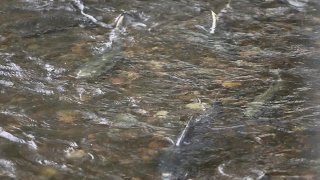
A warning has been issued for people catching fish in Vernon's Hockanum River because of elevated levels of per- and polyfluorinated alkyl substances (PFAS).
The Department of Public Health (DPH) and the Department of Energy and Environmental Protection (DEEP) issued a consumption warning for fish caught in the river after PFAS was detected in fish tissue samples.
The type of foam used to be allowed in routine firefighting situations, but it's since been banned. This is because PFAS is a group of chemicals that can be dangerous if it gets into rivers and groundwater.
People shouldn't eat fish they caught in the Hockanum River starting below the Shenipsit Lake dam on Tolland Avenue to the Connecticut River, including impoundments of Papermill Pond, officials said.
329 medal events. 32 sports. Endless drama. Catch all the action at the Paris Olympics. Sign up for our free Olympics Headlines newsletter.

Fish caught in these areas are shouldn't be consumed: Union Pond in Manchester, several small impoundments or ponds on the Hockanum River in East Hartford, and the Tankerhoosen River from the Hockanum River upstream to the dam at Main Street.
The most recent drinking water sample collected by Connecticut Water showed no PFAS above laboratory limits.
Local
The DPH said fish samples were collected in September 2021 in Vernon between Route 74 and Dart Hill Road. A total of 30 fish representing three species - American eel, fallfish and white sucker - were analyzed for PFAS concentrations. Tissue samples showed PFAS at concentrations above levels considered to be safe for human consumption.
The data was collected by a DEEP consultant as part of a large, statewide study to evaluate the presence of PFAS in the state's waste receiving waters.
While fish caught in the Hockanum River aren't safe to eat, recreational activities like catch and release fishing and boating are safe.
Officials noted that surface water samples collected with fish tissue in Vernon below Shenipsit Lake met drinking water guidelines.
PFAS concentrations in white sucker fish were somewhat lower than the other species that were tested, DPH officials said.
DEEP plans to conduct more monitoring along the Hockanum River to better understand water quality conditions and to find out where the PFAS is coming from.
Officials said DEEP stocked the Hockanum River with over 2,000 trout earlier this spring before receiving the data showing elevated PFAS levels.
Manchester health officials, the North Central Health Department and the East Hartford Health Department are posting signs along the river and at each of the locations mentioned above to remind people of the advisory.
The DPH and DEEP are working together closely. More information about DPH fish consumption advisories can be found here or by calling 877-458-3474.



